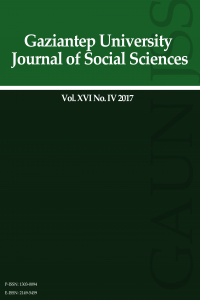Abstract
William
Shakespeare is one of the greatest anachronists. Together with all the historical
inaccuracies for the sake of dramatic effect, he also uses intentional,
unintentional, and “necessary” anachronisms in his plays. While writing his version
of the “Homeric” tale of the Trojan War, Shakespeare brings together the
controversies of the rampantly changing early modern world from a feudal to a
capitalist one in Troilus and Cressida.
In a tale stemming from the antiquity and transformed, even reproduced during
the medieval age through the romance tradition, Shakespeare juxtaposes the
“old” and the “new” in his handling of the medieval/feudal Trojans and early modern/capitalist
Greeks. The “chivalric” medieval age finds its representation especially in
Trojan Hector and the “modern” in Greek Ulysses. This paper examines the ways
in which the past and the present are correlated in Troilus and Cressida and the “chronos” is transformed into “kairos”
with the juxtaposition of contemporary ideologies in a seemingly Homeric world.
Keywords
References
- anachronism. (n.d.). Online Etymology Dictionary. Retrieved September 19, 2017 from Dictionary.com website http://www.dictionary.com/browse/anachronism
- anachronism. (n.d.). Collins English Dictionary - Complete & Unabridged 10th Edition. Retrieved September 19, 2017 from Dictionary.com website http://www.dictionary.com/browse/anachronism
- Burke Peter (1997). The Renaissance. New York: Macmillan.
- --- (2001). “The Sense of Anachronism from Petrarch to Poussin.” Time in the Medieval World. Eds. Chris Humphrey and W. M Ormrod. Suffolk: York Medieval Press. 157-176
- Garber, Marjorie (2008). Profiling Shakespeare. New York: Routledge.
- Frye, Northrop (1993). The Myth of Deliverance: Reflections on Shakespeare’s Problem Comedies. Toronto: U of Toronto P.
- Greenblatt, Stephen (1998). “Murdering Peasants: Status, Genre, and the Representations of Rebellion” Representing the English Renaissance. Ed. Stephen Greenblatt. Berkeley and Los Angeles: U of California P. pp. 1-31
- --- (2005). Will in the World: How Shakespeare Became Shakespeare. London: Pimlico.
- Kaufmann, R.J. (1965). “Ceremonies for Chaos; The Status of Troilus and Cressida.” ELH, vol. 32, no. 2, pp. 139–59.
- Kermode Frank (2000). The Sense of an Ending: Studies in the Theory of Fiction. Oxford: Oxford UP.
- Lukács Georg (1989). The Historical Novel. Trans. Hannah and Stanley Mitchell. London: Merlin Press.
- Muir, Kenneth (2003). “Troilus and Cressida.” The Cambridge Shakespeare Library: Shakespeare Criticism, edited by Catherine M.S. Alexander, vol. 2, Cambridge UP, Cambridge, pp. 423–432.
- Panofski, Erwin (1972). Studies in Iconography: Humanistic Themes in the Art of the Renaissance. Boulder, Colorado: Icon.
- Potter, A. M. (1988). “Troilus and Cressida: Deconstructing the Middle Ages?” Theoria 72: pp. 23-35.
- Rossiter, A.P. (1976). “Troilus as ‘Inquisition’.” Troilus and Cressida: A Selection of Critical Essays. Ed. P. Martin. London: Macmillan, pp. 100-121
- Shakespeare, William. Hamlet (1997). The Riverside Shakespeare. Eds. Herschel Baker, et. al. Boston: Houghton Mifflin. pp. 1183-1245
- --- (2003). Troilus and Cressida. Ed. Anthony B. Dawson. Cambridge: Cambridge UP.
Abstract
William Shakespeare en önemli anakronistlerdendir. Oyunlarında, dramatik
amaçlı yaptığı tarihsel yanlışlıkların yanı sıra bilinçli, bilinçsiz ve
“gerekli” kronik hatalar görülmektedir. Troilus
ve Cressida oyununda Shakespeare, Truva savaşının kendi Homerik hikayesini
yazarken de hızla feodalden kapitaliste dönüşen erken modern çağın tartışmalarını
bir araya getirmektedir. Antik çağa ait olan ve orta çağ boyunca romans
geleneği ile değişen hatta yeniden yazılan hikayede Shakespeare “eski” ve
“yeni”yi orta çağa ait/feudal Truvalılar ve erken modern çağa ait/kapitalist
Yunanlıların temsilleriyle yan yana sunmaktadır. Oyunda orta çağın “şövalyelik”
özelliği Truvalı Hector’da, “modern”e ait özellikler de Yunan Ulysses üzerinden
temsil edilmektedir. Bu makalede Troilus
ve Cressida oyununda geçmiş ve şimdiki zamanın nasıl yoğrulduğu ve çağdaş
ideolojilerin güya Homerik bir dünyada bir araya getirilmesiyle “kronos”un
nasıl “kairos”a dönüştüğünü incelenmektedir.
Keywords
References
- anachronism. (n.d.). Online Etymology Dictionary. Retrieved September 19, 2017 from Dictionary.com website http://www.dictionary.com/browse/anachronism
- anachronism. (n.d.). Collins English Dictionary - Complete & Unabridged 10th Edition. Retrieved September 19, 2017 from Dictionary.com website http://www.dictionary.com/browse/anachronism
- Burke Peter (1997). The Renaissance. New York: Macmillan.
- --- (2001). “The Sense of Anachronism from Petrarch to Poussin.” Time in the Medieval World. Eds. Chris Humphrey and W. M Ormrod. Suffolk: York Medieval Press. 157-176
- Garber, Marjorie (2008). Profiling Shakespeare. New York: Routledge.
- Frye, Northrop (1993). The Myth of Deliverance: Reflections on Shakespeare’s Problem Comedies. Toronto: U of Toronto P.
- Greenblatt, Stephen (1998). “Murdering Peasants: Status, Genre, and the Representations of Rebellion” Representing the English Renaissance. Ed. Stephen Greenblatt. Berkeley and Los Angeles: U of California P. pp. 1-31
- --- (2005). Will in the World: How Shakespeare Became Shakespeare. London: Pimlico.
- Kaufmann, R.J. (1965). “Ceremonies for Chaos; The Status of Troilus and Cressida.” ELH, vol. 32, no. 2, pp. 139–59.
- Kermode Frank (2000). The Sense of an Ending: Studies in the Theory of Fiction. Oxford: Oxford UP.
- Lukács Georg (1989). The Historical Novel. Trans. Hannah and Stanley Mitchell. London: Merlin Press.
- Muir, Kenneth (2003). “Troilus and Cressida.” The Cambridge Shakespeare Library: Shakespeare Criticism, edited by Catherine M.S. Alexander, vol. 2, Cambridge UP, Cambridge, pp. 423–432.
- Panofski, Erwin (1972). Studies in Iconography: Humanistic Themes in the Art of the Renaissance. Boulder, Colorado: Icon.
- Potter, A. M. (1988). “Troilus and Cressida: Deconstructing the Middle Ages?” Theoria 72: pp. 23-35.
- Rossiter, A.P. (1976). “Troilus as ‘Inquisition’.” Troilus and Cressida: A Selection of Critical Essays. Ed. P. Martin. London: Macmillan, pp. 100-121
- Shakespeare, William. Hamlet (1997). The Riverside Shakespeare. Eds. Herschel Baker, et. al. Boston: Houghton Mifflin. pp. 1183-1245
- --- (2003). Troilus and Cressida. Ed. Anthony B. Dawson. Cambridge: Cambridge UP.
Details
| Primary Language | English |
|---|---|
| Subjects | Creative Arts and Writing |
| Journal Section | English Language and Literature |
| Authors | |
| Publication Date | November 7, 2017 |
| Submission Date | October 5, 2017 |
| Acceptance Date | October 26, 2017 |
| Published in Issue | Year 2017 Volume: 16 Issue: 4 |

